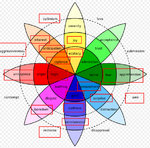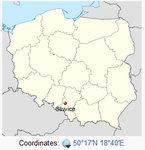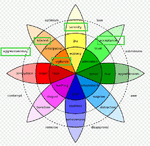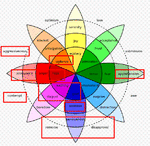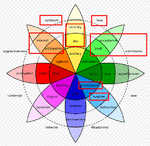Back at home and doing my research on that difference between, sensations, emotions and thoughts and how we can control and if we should control them.
I will quote interesting articles as I browse through them.
Here they use "feeling" as a synonym for "emotion", but otherwise this article is not too useful for my own research:
http://www.wikihow.com/Understand-Your-Emotions
Get in the zone. Each feeling has a particular zone in the body that it travels through.
Fear often starts in the belly and moves upward in the body. Most of us are familiar with butterflies in the belly. Fear, like all feelings, is important because it gives us information with which to keep us safe and healthy. If a person continually ignores their fear sensations or is carrying around old fear that they've never expressed, they can develop physical symptoms in the zone of the body where the fear is blocked. Irritable Bowel Syndrome, ulcers, indigestion,and nausea,are often related to blocked fear in a person's body.
Here instead they differentiate between feelings and emotions, but use "feeling" as a synonym for "sensation":
http://www.differencebetween.net/miscellaneous/difference-between-feelings-and-emotions/
Feelings vs Emotions
Human beings are naturally emotive creatures. We often talk about how we are feeling. Over the course of our lifetimes we will experience millions of different sensations. Even over the course of a day we will not be untouched by feelings and emotions. Often, these two terms are used interchangeably, but there are differences between feelings and emotions that, if known, can help us to understand what’s going on inside a little better.
...
Because of this, you could say that the biggest difference between feelings and emotions is that feelings have to be triggered by an external motivating factor whereas emotions can be completely internalized.
...
Examples of Feelings and Emotions
Feeling can come from the outside world reacting with any of our five senses: warmth, cold, hot, dry, dusty, drenched
Feeling can come from a physical sensation ‘“hungry, thirsty, hurt, ticklish, itchy, tingly
Feeling can come from the result of an emotion‘“ sad, happy, excited, nervous, disgusted, scared, overjoyed.
Emotion can be categorized by degree. For example, disgust can be classed as a lesser degree of hatred. However, several emotional theories state that there are five emotions that are similar to all cultures: love, hate, joy, sorrow, and fear.
So this is pretty hilarious and exhausting, because, as I said, they use "feeling" as a synonym for "sensation", just as I meant it in my previous post. But the other article equated "feelings" with "emotions". So screw all these useless articles on what words mean and find something else. I can't waste days discussing the meaning of words. What matters is that I only mean one thing by them.
Since we can now be sure, regardless of semantics, that there is a difference between feelings and emotions, and they're both thoughts, let us now try to find research on the percentage of time that our mind is busy with a given group of thoughts or another.
Check this title out:
Americans Spend Less Time Thinking, More Time Watching TV Than A Decade Ago
Here they imply that if you're watching TV, you're not thinking. This is totally false. We could say that you're not controlling your thoughts, and that they're being influenced, that's all.

Gee, dumb infographic, according to which we spend 13 minutes a day thinking. These journalists are dumber than my taxi driver.
But this alerts us to one concept. The concept of thinking without doing anything else, which is what they mean when they say "13 minutes", "just thinking and doing nothing else". But it's irrelevant to my studies right now.
Now, this is from Harvard, so maybe it's better:
http://news.harvard.edu/gazette/story/2010/11/wandering-mind-not-a-happy-mind/
People spend 46.9 percent of their waking hours thinking about something other than what they’re doing, and this mind-wandering typically makes them unhappy. So says a study that used an iPhone Web app to gather 250,000 data points on subjects’ thoughts, feelings, and actions as they went about their lives.
Very good. This is what I said: emotions arising from previous events keep us from acting in the present. So here they're also telling us that according to a research, people spend 46.9% of their time thinking about emotions. Well, no, wait. If I am at my job and calculating how much I'm making in the last trade, that is not an emotion, so not all time wasted comes from emotions. It could come from other thoughts. "Wasted" according to the research they're talking about.
The research, by psychologists Matthew A. Killingsworth and Daniel T. Gilbert of Harvard University, is described this week in the journal Science.
“A human mind is a wandering mind, and a wandering mind is an unhappy mind,” Killingsworth and Gilbert write. “The ability to think about what is not happening is a cognitive achievement that comes at an emotional cost.”
Unlike other animals, humans spend a lot of time thinking about what isn’t going on around them: contemplating events that happened in the past, might happen in the future, or may never happen at all. Indeed, mind-wandering appears to be the human brain’s default mode of operation.
Hmm, good. I found the research here:
View attachment KILLINGSWORTH & GILBERT (2010).pdf
Quoting always from the article (I'll read the research later):
To track this behavior, Killingsworth developed an iPhone app that contacted 2,250 volunteers at random intervals to ask how happy they were, what they were currently doing, and whether they were thinking about their current activity or about something else that was pleasant, neutral, or unpleasant.
Subjects could choose from 22 general activities, such as walking, eating, shopping, and watching television. On average, respondents reported that their minds were wandering 46.9 percent of time, and no less than 30 percent of the time during every activity except making love.
“Mind-wandering appears ubiquitous across all activities,” says Killingsworth, a doctoral student in psychology at Harvard. “This study shows that our mental lives are pervaded, to a remarkable degree, by the nonpresent.”
Killingsworth and Gilbert, a professor of psychology at Harvard, found that people were happiest when making love, exercising, or engaging in conversation. They were least happy when resting, working, or using a home computer.
“Mind-wandering is an excellent predictor of people’s happiness,” Killingsworth says. “In fact, how often our minds leave the present and where they tend to go is a better predictor of our happiness than the activities in which we are engaged.”
So here they're saying that the more our mind wanders, the least we're happy with what we're doing. But you see, this is not too related to my research either, because i don't care if I should be making love or not, nor what activity makes me the most happy (in fact I am totally focused right now, so maybe writing the journal is the one activity that makes me the happiest). I care to make money with trading and quit my job. Then I'll pay the prostitutes, all the prostitutes I want.
What I do care about is to measure different types of thoughts in statistical terms, and this article is the closest thing to it, that I've found so far.
The researchers estimated that only 4.6 percent of a person’s happiness in a given moment was attributable to the specific activity he or she was doing, whereas a person’s mind-wandering status accounted for about 10.8 percent of his or her happiness.
Time-lag analyses conducted by the researchers suggested that their subjects’ mind-wandering was generally the cause, not the consequence, of their unhappiness.
“Many philosophical and religious traditions teach that happiness is to be found by living in the moment, and practitioners are trained to resist mind wandering and to ‘be here now,’” Killingsworth and Gilbert note in Science. “These traditions suggest that a wandering mind is an unhappy mind.”
This new research, the authors say, suggests that these traditions are right.
Ok, two idiots from Harvard. Mixing religion with research. I'll take a look at their research, but so far this is bull****.
More Google research and quotes from links.
http://www.transcendyourlimits.com/we-become-what-we-think-about/
Our entire lives are guided by our minds.
The thoughts we allow into our brains every day shape our lives, and determine our future. You may have heard of this idea that we become what we think about from Earl nightingale, we’re going to go into more detail here..
So there is a famous American motivational speaker named Earl Nightingale, who has become famous for his speeches and most commonly his quote: ‘We become what we think about’. He basically claims that the thoughts we have actually determine our entire lives.
He claims that every man is the sum total of his thoughts, and that he’s where he is in life because that’s where he really wants to be. This type of responsibility is actually the case for all of us. We can change our lives at any time, but the intention must be there, otherwise nothing will happen.
What I like about this is that we agree on the fact that we can decide what we think about. Which seems almost obvious to me, but not everyone agrees with. Certainly not my taxi driver.
Everything you do in life and everything you have done has been guided by your thoughts. You might not have always been aware of this, and maybe sometimes it could have seemed like something else was in control, an external factor, maybe your parents or your school?
The truth however, is that everything in your life and even where you are now is a result of your choices. your thoughts become your choices, and therefore you are where you are now because that’s where you have chosen to be. It may be hard to hear this, but it’s the place to start from if you want to improve yourself.
You got yourself here, so you can be assured that you have the power to get yourself somewhere else, anywhere else in fact, that you want to be.
Yeah, bull****. This is a little too much. By definition if I think like Albert Einstein, I will get a good teaching job or similar, but I cannot get to that thinking by sheer will power. So, as they suggest, I can indeed use my will power to direct my thoughts and therefore my life, but not wherever I want, as they suggest. I hope they're not selling me anything at the end of the article.
Yep, they keep mentioning "famous American motivational speaker named Earl Nightingale". He's dead and they don't seem to sell anything right away, although there's a "MAKE MONEY" section in the website, but this is not unbiased as I need it to be.
Let's move on.
http://blog.bufferapp.com/thinking-mistakes-8-common-mistakes-in-how-we-think-and-how-to-avoid-them
...Regardless, I think it’s fascinating to learn more about how we think and make decisions every day, so let’s take a look at some of these thinking habits we didn’t know we had.
1. We surround ourselves with information that matches our beliefs
...
2. We believe in the “swimmer’s body” illusion
The “swimmer’s body illusion” occurs when we confuse selection factors with results. Another good example is top performing universities: are they actually the best schools, or do they choose the best students, who do well regardless of the school’s influence? Our mind often plays tricks on us and that is one of the key ones to be aware of.
...
3. We worry about things we’ve already lost
No matter how much I pay attention to the sunk cost fallacy, I still naturally gravitate towards it.
The term sunk cost refers to any cost (not just monetary, but also time and effort) that has been paid already and cannot be recovered. So, a payment of time or money that’s gone forever, basically.
The reason we can’t ignore the cost, even though it’s already been paid, is that we wired to feel loss far more strongly than gain. Psychologist Daniel Kahneman explains this in his book, Thinking Fast and Slow:
"Organisms that placed more urgency on avoiding threats than they did on maximizing opportunities were more likely to pass on their genes. So, over time, the prospect of losses has become a more powerful motivator on your behavior than the promise of gains."
The sunk cost fallacy plays on this tendency of ours to emphasize loss over gain. This research study is a great example of how it works:
"Hal Arkes and Catehrine Blumer created an experiment in 1985 which demonstrated your tendency to go fuzzy when sunk costs come along. They asked subjects to assume they had spent $100 on a ticket for a ski trip in Michigan, but soon after found a better ski trip in Wisconsin for $50 and bought a ticket for this trip too. They then asked the people in the study to imagine they learned the two trips overlapped and the tickets couldn’t be refunded or resold. Which one do you think they chose, the $100 good vacation, or the $50 great one?"
Over half of the people in the study went with the more expensive trip. It may not have promised to be as fun, but the loss seemed greater....
Excellent article. I need to read all 8 points and then I'll write what I think. So far a few things reminded me of my own trading mistakes, such as insisting with the futures that caused me the biggest losses, because (what an idiot) somehow they "owed" me a lot of money.
...So, just like the other mistakes I’ve explained in this post, the sunk cost fallacy leads us to miss or ignore the logical facts presented to us, and instead make irrational decisions based on our emotions—without even realizing we’re doing so:
"The fallacy prevents you from realizing the best choice is to do whatever promises the better experience in the future, not which negates the feeling of loss in the past."
Being such a subconscious reaction, it’s hard to avoid this one. Our best bet is to try to separate the current facts we have from anything that happened in the past. For instance, if you buy a movie ticket only to realize the movie is terrible, you could either:
a) stay and watch the movie, to “get your money’s worth” since you’ve already paid for the ticket (sunk cost fallacy)
or
b) leave the cinema and use that time to do something you’ll actually enjoy.
The thing to remember is this: you can’t get that investment back. It’s gone. Don’t let it cloud your judgement in whatever decision you’re making in this moment—let it remain in the past.
I told you, just in like in bad trading, where we let the previous trade (whether win or loss) influence the next trade and let the name of the stock influence our game (depending on whether it caused us losses or wins in the past).
4. We incorrectly predict odds
Imagine you’re playing Heads or Tails with a friend. You flip a coin, over and over, each time guessing whether it will turn up heads or tails. You have a 50/50 chance of being right each time.
Now suppose you’ve flipped the coin five times already and it’s turned up heads every time. Surely, surely, the next one will be tails, right? The chances of it being tails must be higher now, right?
Well, no. The chances of tails turning up are 50/50. Every time. Even if you turned up heads the last twenty times. The odds don’t change.
Yeah, I knew about this, but I won't quote the remaining ones unless they get back to my question of how much time we spend on specific types of thoughts.
Ok, nothing good.
More searches on how our brain is busy, with different thoughts.
Differences of brain vs computer:
https://faculty.washington.edu/chudler/bvc.html
It is easier to fix a computer - just get new parts. There are no new or used parts for the brain. However, some work is being done with transplantation of nerve cells for certain neurological disorders such as Parkinson's disease. Both a computer and a brain can get "sick" - a computer can get a "virus" and there are many diseases that affect the brain. The brain has "built-in back up systems" in some cases. If one pathway in the brain is damaged, there is often another pathway that will take over this function of the damaged pathway.
The brain is always changing and being modified. There is no "off" for the brain - even when an animal is sleeping, its brain is still active and working. The computer only changes when new hardware or software is added or something is saved in memory. There IS an "off" for a computer. When the power to a computer is turned off, signals are not transmitted.
The computer is faster at doing logical things and computations. However, the brain is better at interpreting the outside world and coming up with new ideas. The brain is capable of imagination.
As I read (and I am not quoting all I read on that link), I also monitor for brain's edges on computers that might be lost by eliminating emotions, but so far none.
More on computers vs brains, this link is very good:
http://scienceblogs.com/developingintelligence/2007/03/27/why-the-brain-is-not-like-a-co/
Difference # 2: The brain uses content-addressable memory
In computers, information in memory is accessed by polling its precise memory address. This is known as byte-addressable memory. In contrast, the brain uses content-addressable memory, such that information can be accessed in memory through “spreading activation” from closely related concepts. For example, thinking of the word “fox” may automatically spread activation to memories related to other clever animals, fox-hunting horseback riders, or attractive members of the opposite sex.
The end result is that your brain has a kind of “built-in Google,” in which just a few cues (key words) are enough to cause a full memory to be retrieved. Of course, similar things can be done in computers, mostly by building massive indices of stored data, which then also need to be stored and searched through for the relevant information (incidentally, this is pretty much what Google does, with a few twists).
Yeah, this is where something went wrong with my brain lately. Less efficiency in content-addressable memory. Most likely due to stress or maybe something I don't know. Of course if the person is a regular idiot, such as one of my colleagues, they're not going to have any type of connection whatsoever, and they're going to ask me to solve their problems.
Anyway, that link is great, very cultured, very refined and precise, although in some way pedantic, and I don't want to quote it anymore.
More on my quest about the time wasted by a given type of thoughts, more down to earth links now.
This is awesome, but you don't need to click the link, since it's all in the title:
Regret is just wasting time thinking about time wasted.
Couple more links and I am done for today. It sucks that no one has made important research on my subject. Or that I could not find it.
Let's go over the last few links.
http://www.marcandangel.com/2014/02/05/25-things-you-need-to-stop-wasting-time-on/
5. The desire for everything you don’t have. – No, you won’t always get exactly what you want, but remember this: There are lots of people who will never have what you have right now. The things you take for granted, someone else is praying for. Happiness never comes to those who don’t appreciate what they already have.
6. Comparing yourself to everyone else. – Social comparison is the thief of happiness. You could spend a lifetime worrying about what others have, but it wouldn’t get you anything. (Read The How of Happiness.)
Down to earth advice but it made me mature a little bit.
14. Trying to impress everyone. – One of the most freeing things we learn in life is that we don’t have to like everyone, everyone doesn’t have to like us, and that’s perfectly OK. No matter how you live, someone will be disappointed. So just live your truth and be sure YOU aren’t the one who is disappointed in the end.
15. All the fears holding you back. – Fear is a feeling, not a fact. The best way to gain strength and self-confidence is to do what you’re afraid to do. Dare to change and grow. In the end, there is only one thing that makes a dream completely impossible to achieve: Lack of action based on the fear of failure.
Yeah, they keep saying things I've said in the last few weeks, but I reached the conclusions on self-interest grounds. Not "don't get yourself down" but "don't get yourself down or up, because emotions don't make sense".
17. People who continuously dump on your dreams. – It’s better to be lonely than allow negative people and their opinions derail you from your destiny. Don’t let others crush your dreams. Do just once what they say you can’t do, and you will never pay attention to their negativity again.
Yep, already done this. My father in this case. Criticizing me my whole life.
22. Resentment. – Kindness is not to be mistaken for weakness, nor forgiveness for acceptance. It’s about knowing that resentment is not on the path to happiness. Remember, you don’t forgive people because you’re weak. You forgive them because you’re strong enough to know that people make mistakes.
23. Any hateful thoughts at all. – Set an example. Treat everyone with kindness and respect, even those who are rude to you – not because they are nice, but because you are. Make kindness a daily ritual; it’s what makes life happier and more fulfilling in the long run.
Yeah, I'll do this, too, but only as long as it's convenient. If I could get rid of a few people by sending Fat Clemenza to their house or killing them by pushing a button, I would do it immediately. But since it might be convenient, let us be polite, yet not with everyone.
24. Regrets of any kind. – You don’t have to be defined by the things you once did or didn’t do. Don’t let yourself be controlled by regret. Maybe there’s something you could have done differently, or maybe not. Either way, it’s merely something that has already happened. Leave the unchangeable past behind you as you give yourself to the present moment.
Yeah, this is good, too, although everything sounds spiritual, whereas I see it more as math. If it's convenient, it should be done, otherwise not. No absolute principles of conduct. In some cases, it might even be convenient to cry, so you should cry and get it over with. Instead of fighting it in vain.
OK, here's what just happened. The evil whore, neighbor slamming bitch next door just violently slammed her door once again. It sounded like a sonic boom, but like... a few meters from me.
So, first instinct was hate. Why should a person do this? Especially after being told that it bothers me?
So, within a couple of seconds, I said: what minimizes the damage?
By the way, that was a sensation of loud noise, so this is not something you can just ignore. It's going to bother you in any case. But it bothers me 10 times as much if it is a human doing it, and if that human could avoid it.
So anyway, the unpleasant sensation was followed by an unpleasant emotion, which was followed by some reasoning, and I said to myself: "good test".
And said: to minimize the damage what should I do? React as if the noise had been produced by a garbage truck or by jet plane (although theirs is not as loud).
So, ok, now that is behind me and I won't allow myself to dwell over this bitch any longer.
But if the bitch should ring my bell and ask me for anything, I won't open the door. If she's dying, maybe I'll open the door and make sure she really dies.
So this is to say that it is not about forgiveness, being a Christian, but entirely about convenience, and that I am marking on my notebook that this bitch... owes me a lot of annoyances. Certainly I won't worry about keeping the music too loud or anything like that. Which indeed might have just shown me the advantage of being such assholes for neighbors: they won't dare complain to us about anything we do.
One last thing. Having studied my body language and clues of frustration on my face, as soon as I heard the unpleasant noise, I checked my face and monitored for signs of stress, and tried to relax it. I felt tension around my eyes. I feel the same way when I am around annoying people at work, even if they don't talk -- I am always afraid they'll say something annoying.
The orangutan might leave me alone precisely because he sees this tension (expression of seriousness, and gravity) in my face. So this tension might actually be useful in some cases, because it tells people to leave me alone, without actually having to tell them anything rude.
----
Practical example of 1) how I used to deal with the door-slamming bitch, of 2) how I deal with her now, and of 3) how I plan to deal with her in the future:

If I could apply this methodology in my entire life and trading, imagine what kind of profit I could reap. It's like a 300% increase in efficiency.
I wonder why we're not taught this from an early age, or maybe some of us are taught just this, when they're told to "don't worry, be happy" and similar things, such as "don't dwell on it". But I am not sure... I don't think anyone really understands as well as I've understood it now.


